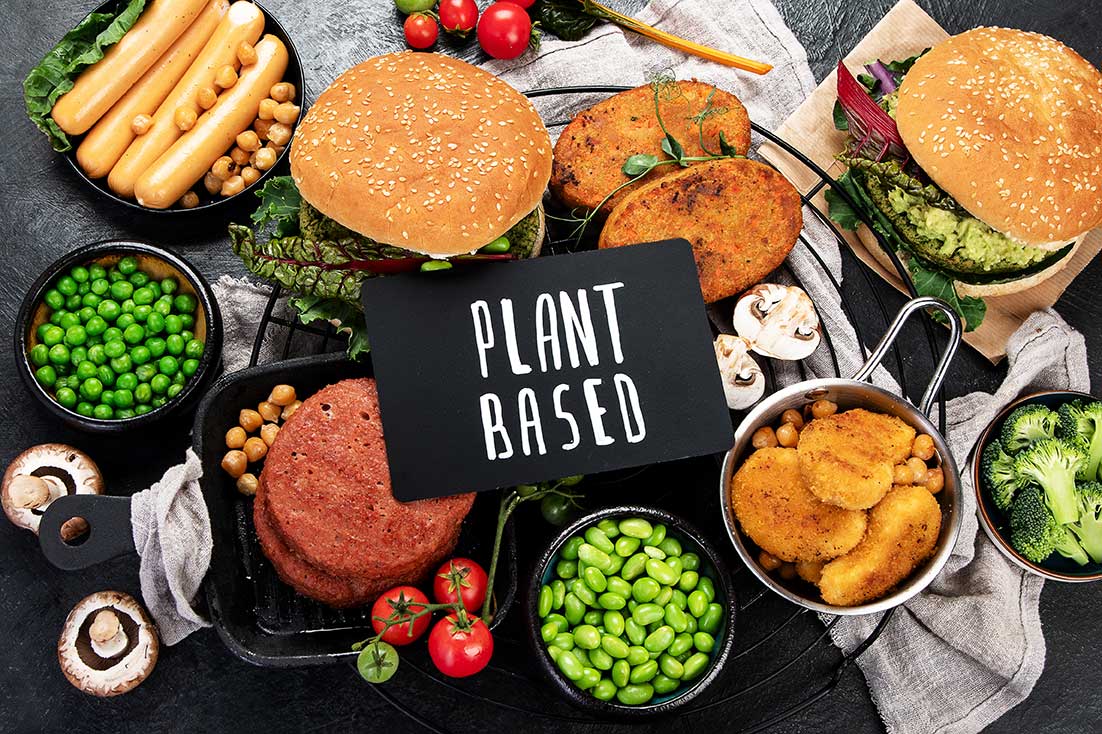Are These BBQ Sauces Really Plant-Based? We Investigated
Wiki Article
All About Healthy Food: Advantages of Taking On Plant Based Options
The discussion surrounding plant-based diet plans has gained considerable attention in recent times. Many individuals are discovering the possible wellness benefits, dietary benefits, and environmental impacts connected with these dietary options. As people become more mindful of their food's influence on health and sustainability, questions arise about the usefulness of adopting such a way of life. What certain modifications can one expect, and how might these options improve not just individual health however likewise the earth's future?Recognizing Plant-Based Diet Plans
Lots of individuals associate plant-based diet plans mainly with vegetarianism or veganism, these diets can incorporate a large range of eating patterns that focus on whole, minimally refined plant foods. Such diets frequently consist of fruits, veggies, whole grains, nuts, seeds, and vegetables, while limiting or getting rid of pet products. This versatility allows people to customize their dietary selections according to personal preferences and nutritional requirements. Some might adopt a primarily plant-based diet plan while still sometimes consuming meat or dairy products, often referred to as a flexitarian technique. The focus stays on integrating even more plant foods, which can result in a varied range of tastes and dishes. Understanding these various interpretations of plant-based consuming is necessary for appreciating its access and allure in contemporary food culture.Health And Wellness Perks of Plant-Based Foods
The wellness advantages of plant-based foods are significant, providing a nutrient density advantage that supports general wellness. Study shows that these foods can boost heart wellness and play a vital function in efficient weight monitoring. By including more plant-based options, individuals may enhance their nutritional selections and advertise long-term health.Nutrient Density Advantage
Nutrient thickness plays an essential role in the health advantages of plant-based foods, making them an engaging selection for those looking for a balanced diet plan. Plant-based foods, such as fruits, vegetables, legumes, nuts, and entire grains, are often abundant in crucial vitamins, minerals, and anti-oxidants while being reduced in calories. This high nutrient density allows people to eat less calories while still satisfying their nutritional needs. In addition, these foods are loaded with dietary fiber, promoting digestive wellness and helping in weight administration. By incorporating nutrient-dense plant-based alternatives, customers can enhance their overall wellness, sustain their immune systems, and minimize the danger of chronic diseases. Inevitably, the nutrient thickness of plant-based foods highlights their importance in a health-conscious way of life.Heart Health Renovation

Weight Administration Support
Along with advertising heart health and wellness, a plant-based diet can substantially help in weight administration. This dietary strategy emphasizes entire foods such as fruits, vegetables, vegetables, nuts, and whole grains, which are generally lower in calories and greater in fiber compared to animal-based items. The high fiber material aids enhance satiation, decreasing total calorie intake. Plant-based diets are commonly rich in vital nutrients while reduced in unhealthy fats, making it much easier to keep a healthy weight. Research study shows that individuals who embrace a plant-based way of living tend to have lower body mass indexes (BMIs) and experience even more effective weight reduction compared to those that eat meat-heavy diets. Welcoming plant-based alternatives is a strategic choice for efficient weight administration.
Nutritional Worth of Plant-Based Active Ingredients
Plant-based active ingredients are abundant in essential nutrients, providing a diverse range of vitamins, minerals, and anti-oxidants that contribute to general health and wellness. A contrast of healthy protein sources exposes that while animal products are typically deemed superior, several plant-based options give ample protein and various other helpful substances. Recognizing the dietary worth of these components can assist individuals make informed dietary choices.Essential Nutrients in Plants
Nutrient-rich ingredients located in plants supply a varied variety of necessary minerals and vitamins that contribute significantly to overall health. These active ingredients are abundant in vitamins A, C, and K, which support immune function, vision, and blood clot, specifically. In addition, plants provide important minerals such as calcium, magnesium, and potassium, critical for heart health and wellness, muscle mass feature, and bone stamina. The presence of fiber in plant-based foods help digestion check my source and promotes a healthy and balanced intestine microbiome. Anti-oxidants, found perfectly in vegetables and fruits, assistance combat oxidative stress and anxiety and minimize inflammation. In addition, numerous plant foods are reduced in calories yet high in nutrients, making them an exceptional choice for those looking for to maintain a healthy and balanced weight while guaranteeing excellent nutrient intake.Contrasting Healthy Protein Resources
Healthy protein resources differ considerably in their dietary accounts, with plant-based active ingredients supplying one-of-a-kind benefits. Unlike animal proteins, which frequently contain saturated fats and cholesterol, plant healthy proteins often tend to be reduced in these undesirable elements. Legumes, nuts, seeds, and whole grains are abundant in crucial amino acids, fiber, vitamins, and minerals. For example, lentils supply high protein content along with considerable iron and folate, while quinoa is a complete protein, supplying all nine important amino acids. Furthermore, plant-based proteins are usually gone along with by antioxidants and phytochemicals that sustain overall wellness. The shift to plant-based healthy protein sources not just improves dietary intake yet likewise aligns with lasting nutritional methods, reducing ecological impact and promoting lasting health and wellness advantages.Environmental Influence of Plant-Based Eating
As understanding of climate modification grows, many individuals are discovering sustainable nutritional choices that can considerably lessen their environmental impact. Plant-based eating has become a substantial contributor to reducing greenhouse gas discharges, which are primarily related to livestock production. The growing of fruits, grains, vegetables, and veggies typically requires fewer resources, such as water and land, contrasted to pet farming. In addition, plant-based diets can result in reduced logging, as much less land is needed for grazing livestock or growing animal feed. By moving in the direction of plant-based alternatives, customers can sustain biodiversity and advertise much healthier ecosystems. On the whole, embracing plant-based eating not only benefits personal health and wellness however likewise stands for an essential action towards ecological sustainability and preservation initiatives.Conquering Common Misconceptions
While several people identify the advantages of a plant-based diet regimen, numerous false impressions often discourage them from fully embracing this lifestyle. A common idea is that plant-based diet regimens do not have enough healthy protein; nevertheless, various plant sources, such as legumes, nuts, and tofu, provide ample healthy protein. In addition, some think that this diet plan is costly, when actually, staples like beans, rice, and seasonal vegetables can be fairly budget friendly. An additional false impression is that plant-based eating is overly limiting, whereas it really provides a diverse selection of flavors and foods. Lots of worry that a plant-based diet regimen may lead to deficiencies, yet with appropriate planning, people can obtain all essential nutrients, including vitamins and minerals, while appreciating a broad selection of tasty dishes. Broad Tips for Transitioning to a Plant-Based Lifestyle Making the change to a plant-based lifestyle can be an enhancing experience, though it frequently calls for some assistance to browse the initial modifications. People are urged to start slowly, including more fruits, vegetables, beans, and whole grains into their dishes while lowering meat and dairy usage. Dish preparation is vital; preparing an once a week menu can help alleviate the adjustment and protect against last-minute unhealthy options. Checking out cooking approaches and new recipes can also preserve and enhance the experience excitement concerning plant-based eating. In addition, signing up with assistance groups or neighborhoods can supply inspiration and share beneficial tips. Ultimately, remaining informed about nutrition guarantees balanced meals, avoiding deficiencies while promoting a healthy, gratifying plant-based way of living.Delicious Plant-Based Dish Ideas
Checking out delicious plant-based meal concepts can inspire individuals to welcome a more healthy diet regimen. One popular choice is a passionate quinoa salad, featuring cherry tomatoes, cucumber, and a spicy lemon-tahini clothing. Another favorite is a full-flavored lentil stew, packed with carrots, celery, and aromatic natural herbs, excellent for a reassuring supper. see it here For morning meal, overnight oats made with almond milk, chia seeds, and covered with fresh berries give a nourishing beginning to the day. In addition, a vivid vegetable stir-fry with tofu and a selection of vivid veggies can be a fast yet satisfying meal. Velvety avocado salute on whole-grain bread, sprayed with spices and seeds, offers an easy yet delicious treat. These dishes display the selection and splendor of plant-based eating.
Often Asked Concerns
Can a Plant-Based Diet Plan Supply Sufficient Healthy Protein?
The concern of whether a plant-based diet plan can provide adequate healthy protein is typical. Various sources, consisting of vegetables, nuts, seeds, and whole grains, can fulfill protein requires successfully, supporting a nourishing and balanced diet for individuals.Are Plant-Based Diets Ideal for Children?
The viability of plant-based diets for youngsters depends on mindful planning. Ample nutrients should be ensured, including minerals, vitamins, and healthy proteins. With proper support, such diet regimens can support healthy and balanced growth and advancement in youngsters.Exactly how Do I Dine Out on a Plant-Based Diet plan?
Eating in restaurants on a plant-based diet includes looking for restaurants with diverse menus, requesting adjustments, and discovering vegan-friendly options. have a peek at these guys Planning ahead and connecting nutritional choices can boost the dining experience while preserving dietary choices.What Are Typical Allergens in Plant-Based Foods?
Common irritants in plant-based foods include soy, gluten, nuts, and seeds - Sugar Free Sauces. Individuals adhering to a plant-based diet must understand these allergens and review tags meticulously to stay clear of adverse reactions and guarantee risk-free intakeCan Plant-Based Diets Help With Weight Reduction?
Research shows that embracing a plant-based diet may promote fat burning due to its usually lower calorie thickness and greater fiber web content. This combination can improve satiation, aiding individuals manage their calorie intake successfully. Many individuals associate plant-based diets primarily with vegetarianism or veganism, these diet plans can include a vast variety of eating patterns that prioritize whole, minimally processed plant foods. Nutrient thickness plays an essential duty in the health and wellness benefits of plant-based foods, making them a compelling selection for those looking for a balanced diet regimen. Plant-based diets have actually been revealed to substantially enhance heart health and wellness, as they frequently have elements that sustain cardio function. In addition to advertising heart health, a plant-based diet regimen can substantially assist in weight administration. An usual idea is that plant-based diets do not have enough healthy protein; nevertheless, countless plant sources, such as vegetables, nuts, and tofu, provide sufficient healthy protein.Report this wiki page